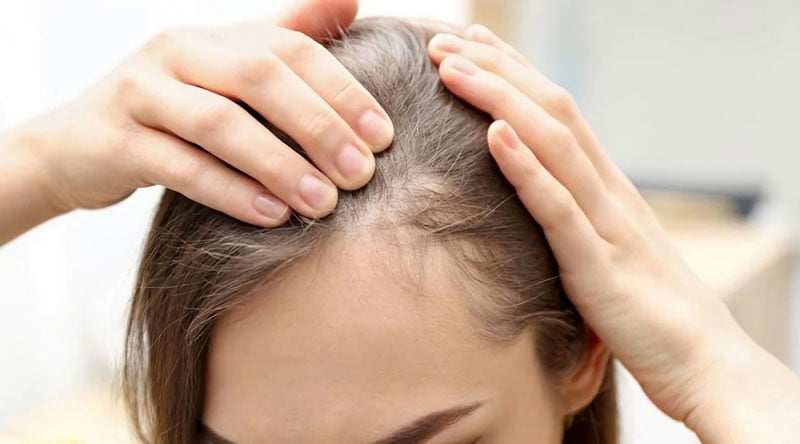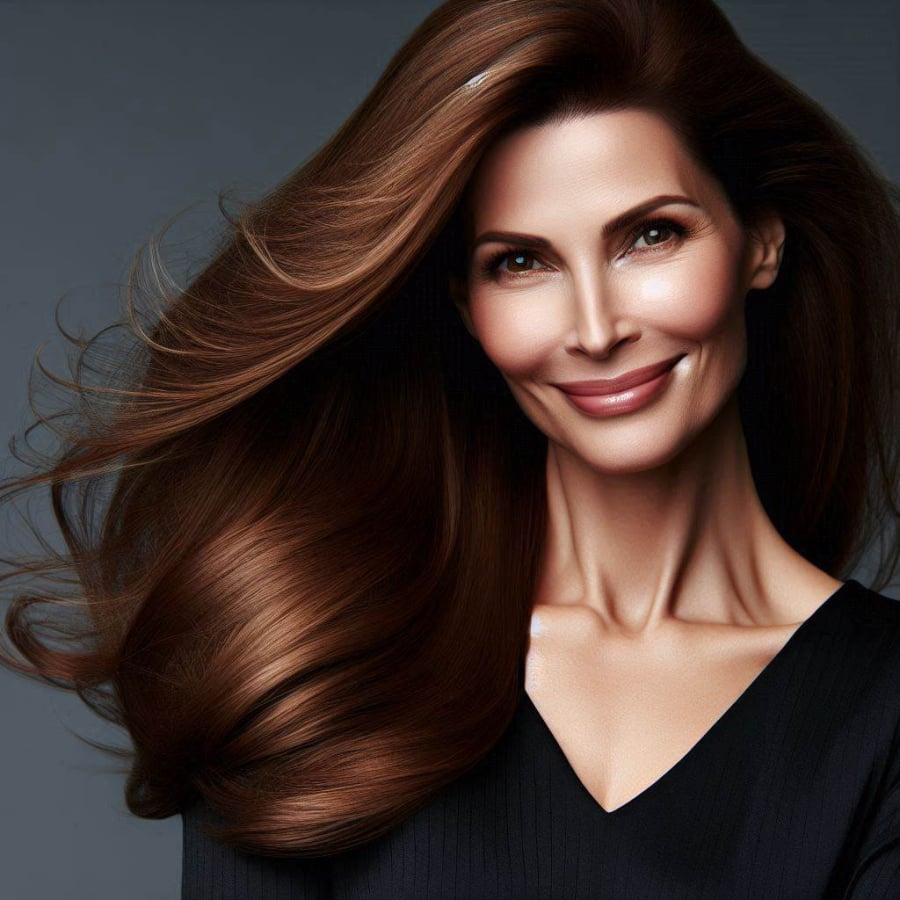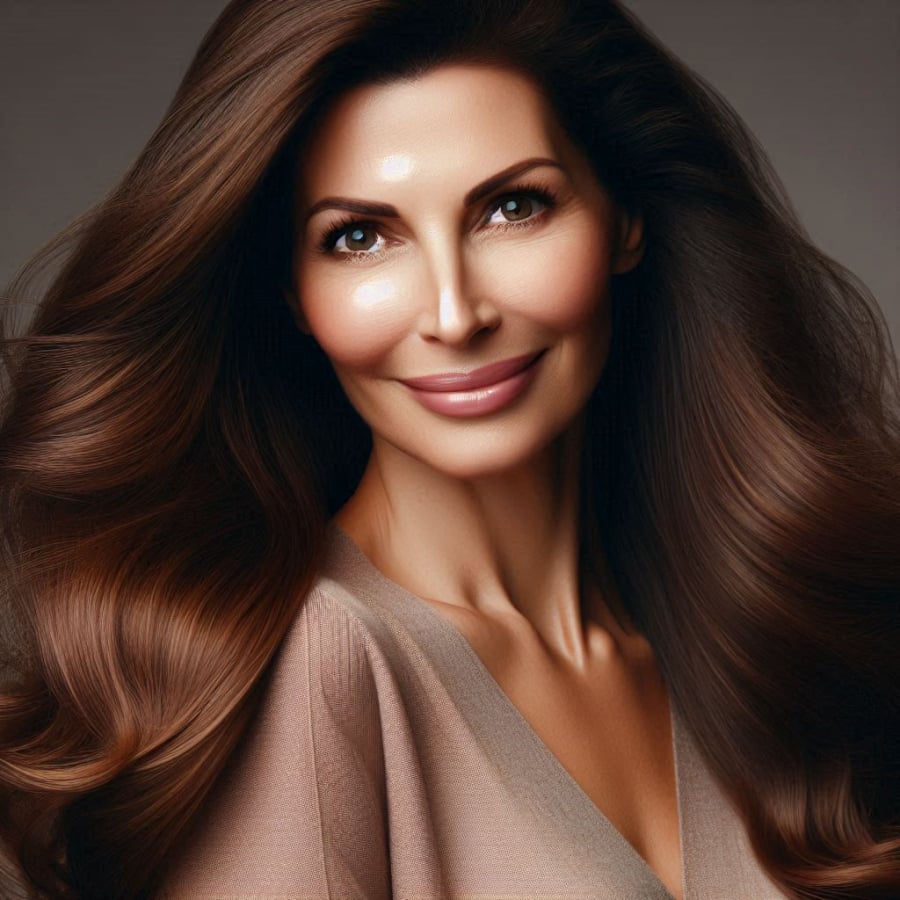## Why Your Hair May Be Thinning in Your 40s and How to Fix It
As we enter our 40s, many of us may notice significant changes in our hair: from thinning and breakage to a loss of shine. These changes are often a result of natural aging, environmental factors, and even improper hair care routines. However, the good news is that improving thin hair is achievable if you know the right care methods and apply suitable solutions.
Why is hair thinning in middle age?
Hair thinning in middle age is a result of various factors, including hormonal changes, natural aging, environmental influences, and lifestyle. The decline in estrogen, progesterone, and testosterone slows hair growth and makes it more prone to breakage, while aging also causes hair follicles to shrink, reducing natural oil production and making hair drier and weaker.
To improve hair health, maintaining a nutrient-rich diet, using suitable hair care products, protecting hair from environmental damage, and hormone regulation are effective solutions to help restore and maintain healthy hair.

Hair thinning in middle age can be attributed to a combination of factors
Here are five tips for thicker, healthier hair for women over 40:
1. Nutritional Care
Healthy hair starts with a well-balanced diet. Nutritionists recommend nourishing hair from within by consuming essential nutrients, which act as “building blocks” for strong, resilient hair.
Key nutrients to include are:
– Protein: Being the primary component of hair, it enhances elasticity and minimizes breakage. Excellent protein sources include eggs, chicken, fish, and beans.
– Iron: Crucial for blood circulation, delivering oxygen and nutrients to hair follicles. Iron-rich foods include spinach, red meat, and nuts.
– Omega-3: Moisturizes the scalp, promoting hair follicle growth. Salmon, walnuts, and chia seeds are great omega-3 sources to incorporate into your diet.
– Vitamin E: Shields hair from environmental damage and prevents dryness.

A well-balanced diet is the foundation for healthy, vibrant hair
2. Moisture Retention: The Key to Soft, Supple Hair
Water is essential not only for overall health but also for maintaining hydrated, supple hair. Adequate water intake ensures moisture retention in the scalp, preventing dryness, split ends, and breakage.
Here are some effective ways to keep your hair moisturized:
– Drink at least eight glasses of water daily to hydrate your body and hair.
– Use deep conditioning treatments like hair masks or conditioners containing ceramides and natural oils.
– Protect your hair with a hat when outdoors in the sun or strong winds, especially during winter.
3. Scientific Hair Care
From the age of 40 onwards, hair becomes more sensitive and vulnerable to damage, so it’s important to adjust your hair care routine accordingly.
Useful hair care habits to adopt include:
– Reduce hair washing frequency to 2-3 times per week to preserve natural oils.
– Opt for a soft brush to minimize hair and scalp damage.
– Limit heat styling: Avoid frequent use of hair dryers, curlers, or straighteners at high temperatures. When necessary, use heat protectant products before styling.
– Apply natural hair oils: Oils like coconut, argan, or olive oil provide moisture and effectively repair damaged hair.

Hair becomes more delicate in our 40s, requiring adjusted care routines
4. Shield Your Hair from Environmental Factors
Harsh sunlight, air pollution, and extreme weather conditions can severely damage your hair. These elements weaken the hair cuticle, leading to dryness, loss of natural shine, and increased breakage. Therefore, protecting your hair from these factors is not just a preventive measure but also an essential step in maintaining youthful, vibrant hair.
Effective hair protection methods include:
– Use hair care products with SPF or antioxidants to shield hair from UV rays and free radicals, thus preserving moisture and natural color.
– Apply natural hair oils like argan, jojoba, or coconut oil before going out to create a protective barrier against heat, pollution, and dry air. This is especially important during cold seasons or when exposed to polluted environments.
– Cover your hair with a hat or scarf to shield it from direct sun, wind, and dust while also making a fashion statement. This simple act helps maintain hair hydration and health.
5. Hormone Regulation
After the age of 40, fluctuations in hormones, particularly the decrease in estrogen and progesterone, directly impact hair health. This leads to slower hair growth, increased hair loss, and thinning over time. To address this, hormone regulation is necessary for long-term hair health and growth.
An effective way to balance hormones is by:
– Incorporating phytoestrogen-rich foods like soy, flaxseeds, sesame seeds, and whole grains. These compounds compensate for estrogen deficiency, supporting hair follicle health and reducing breakage.
– Taking dietary supplements with vitamin D, biotin, collagen, omega-3, and zinc to balance hormones and provide essential nutrients for hair growth.
– Maintaining a healthy lifestyle: Adequate sleep, regular exercise, stress reduction, and avoiding stimulants like alcohol and cigarettes are crucial for stable hormone levels. A healthy body with balanced hormones is the foundation for thick, lustrous hair.
































